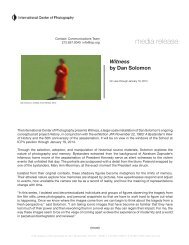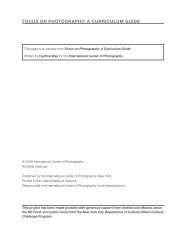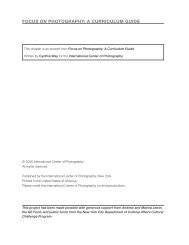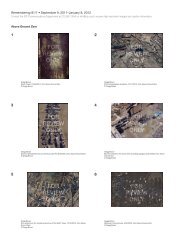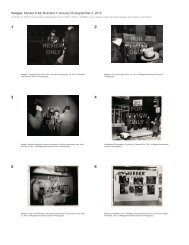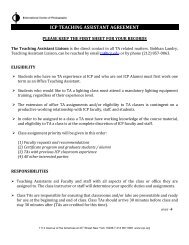Press Release PDF - International Center of Photography
Press Release PDF - International Center of Photography
Press Release PDF - International Center of Photography
You also want an ePaper? Increase the reach of your titles
YUMPU automatically turns print PDFs into web optimized ePapers that Google loves.
Contact: Communications Department<br />
212.857.0045 info@icp.org<br />
media release<br />
Wang Qingsong:<br />
When Worlds Collide<br />
On view from<br />
January 21<br />
through<br />
May 8, 2011<br />
Media Preview<br />
January 20, 2011<br />
11:30 am–1:00 pm<br />
RSVP:<br />
info@icp.org<br />
212.857.0045<br />
Wang Qingsong<br />
Competition, 2004<br />
© Wang Qingsong<br />
Courtesy <strong>of</strong> the artist<br />
Wang Qingsong: When Worlds Collide, a solo exhibition by one <strong>of</strong> China’s most innovative contemporary artists, is on view<br />
at the <strong>International</strong> <strong>Center</strong> <strong>of</strong> <strong>Photography</strong> (1133 Avenue <strong>of</strong> the Americas at 43rd Street) from January 21 through May 8,<br />
2011. Featuring a dozen large-scale photographs and three video works, it is the most extensive U.S. showing to date <strong>of</strong><br />
the work <strong>of</strong> this leading Chinese artist.<br />
Since turning from painting to photography in the late 1990s, Beijing-based artist Wang Qingsong (pronounced “wahng<br />
ching sahng”) has created compelling works that convey an ironic vision <strong>of</strong> 21st-century China’s encounter with global<br />
consumer culture. Working in the manner <strong>of</strong> a motion-picture director, he conceives elaborate scenarios involving dozens<br />
<strong>of</strong> models that are staged on film studio sets. The resulting color photographs employ knowing references to classic<br />
Chinese artworks to throw an unexpected light on today’s China, emphasizing its new material wealth, its uninhibited<br />
embrace <strong>of</strong> commercial values, and the social tensions arising from the massive influx <strong>of</strong> migrant workers to its cities.<br />
Because he uses elaborate studio settings and stylized arrangements <strong>of</strong> models to make his enormous color photographs,<br />
Wang Qingsong is sometimes likened to such contemporary artists as Gregory Crewdson. A more telling comparison,<br />
however, might be to an earlier figure like George Grosz, whose paintings from Weimar-era Berlin are similarly filled with<br />
needling social observation, sardonic humor, calculated awkwardness, and sometimes grotesque exaggeration. In Wang<br />
Qingsong’s works, the artist’s deep-seated attachment to his country mixes with frequent dismay at its boom-era excesses.<br />
China. He recoils from what he calls the “superficial splendor” <strong>of</strong> today’s Chinese nouveau-riche taste, yet he also insists,<br />
“I like Chinese civilization. It <strong>of</strong>fers an enormous space for imagination. Things take one form today, and then change to<br />
another form tomorrow.”<br />
Wang Qingsong: When Worlds Collide includes twelve <strong>of</strong> the artist’s oversized photo works—some measuring up to 21<br />
feet in length—and three <strong>of</strong> his recent videos. In addition, a series <strong>of</strong> documentary videos on view adjacent to the exhibition<br />
galleries takes viewers inside the artist’s studio, allowing them to follow step-by-step the creation <strong>of</strong> several <strong>of</strong> the major<br />
works appearing in the show.<br />
1133 Avenue <strong>of</strong> the Americas at 43rd Street New York NY 10036 T 212 857 0045 F 212 857 0090 www.icp.org
Wang Qingsong Biography<br />
Born in 1964, Wang Qingsong grew up in the Daqing oilfields in Heilongjiang Province in northeastern China, where his<br />
parents were employed. From a young age he set his sights on becoming an artist, although the path that he followed<br />
was hardly an easy one. When his father died in an oilfield accident and left his family without financial support, the<br />
15-year-old boy immediately took his father’s old place on a drilling platform and worked there for the next eight years,<br />
while continuing to take art classes and to seek admission to China’s top art academies. Following his acceptance by the<br />
prestigious Sichuan Fine Arts Institute, Wang Qingsong trained as an oil painter, graduating in 1992. Determined to make<br />
his way as an independent artist, he arrived in Beijing in 1993, just as Chinese contemporary art was beginning to attract<br />
international attention.<br />
Wang Qingsong first won recognition as a painter in the mid-1990s through his membership in the Gaudy Art group, a<br />
movement influenced by the work <strong>of</strong> Jeff Koons and championed by China’s most influential art critic, Li Xianting. In 1997<br />
he abandoned painting and took up photography, a medium that enabled him to quickly register and comment upon the<br />
economic and social changes that were sweeping China. His work has now appeared in more than 20 solo exhibitions and<br />
over 80 group exhibitions. He has exhibited internationally at such venues as the Sydney Biennale, the Gwangju Biennale,<br />
the Havana Biennial, the Getty Museum, the Hammer Museum, the Mori Art Museum, the National Gallery <strong>of</strong> Canada, ZKM<br />
Karlsruhe, the Moscow House <strong>of</strong> <strong>Photography</strong>, and P.S. 1 Contemporary Art <strong>Center</strong>. His work was prominently featured in<br />
the 2004 ICP exhibition Between Past and Future: New <strong>Photography</strong> and Video from China.<br />
In 2001, ICP was the first museum to acquire the work <strong>of</strong> Wang Qingsong for its permanent collection. Since that time his<br />
works are now in the collections <strong>of</strong> such institutions such as the Getty Museum, the Victoria & Albert Museum, the Mori<br />
Art Museum, the National Art Museum <strong>of</strong> Brazil, the Hammer Museum, the Brooklyn Museum, the Philadelphia Museum <strong>of</strong><br />
Art, the New Orleans Museum <strong>of</strong> Art, and the San Diego Art Museum.<br />
This exhibition was made possible with support from the ICP Exhibitions Committee, the E. Rhodes and Leona<br />
B. Carpenter Foundation, Mark McCain and Caro Macdonald/Eye and I, Michelle and Mark Edmunds, Larry Warsh,<br />
Richard Born, and with public funds from the New York City Department <strong>of</strong> Cultural Affairs in partnership with the City<br />
Council.<br />
Curator<br />
Christopher Phillips has been a curator at the <strong>International</strong> <strong>Center</strong> <strong>of</strong> <strong>Photography</strong> in New York City since 2000, after serving<br />
for 10 years as senior editor at Art in America magazine. In 2004, he and Wu Hung <strong>of</strong> the University <strong>of</strong> Chicago organized<br />
the first major U.S. exhibition <strong>of</strong> Chinese contemporary photography, “Between Past and Future: New <strong>Photography</strong> and<br />
Video from China.” Since that time he has curated the ICP exhibitions “Atta Kim: On-Air” (2006), and “Heavy Light: Recent<br />
<strong>Photography</strong> and Video from Japan” (2008). He has also served as a member <strong>of</strong> the curatorial team that organized the<br />
2003, 2006, and 2009 installments <strong>of</strong> the ICP Triennial <strong>of</strong> Contemporary <strong>Photography</strong> and Video.<br />
ICP Library Exhibition <strong>of</strong> Books by Chinese Artists<br />
Accompanying Wang Qingsong: When Worlds Collide, the ICP Library presents an exhibition <strong>of</strong> books by and about Chinese<br />
contemporary artists, selected from the library’s holdings. Titled Chinese <strong>Photography</strong> in Print, it includes publications by<br />
such artists as Ai Weiwei, Cao Fei, Hai Bo, Hong Lei, Lin Tianmiao, Liu Zheng, Miao Xiaochun, Qiu Zhijie, Rong Rong & Inri,<br />
Wang Qingsong, and Xing Danwen.



